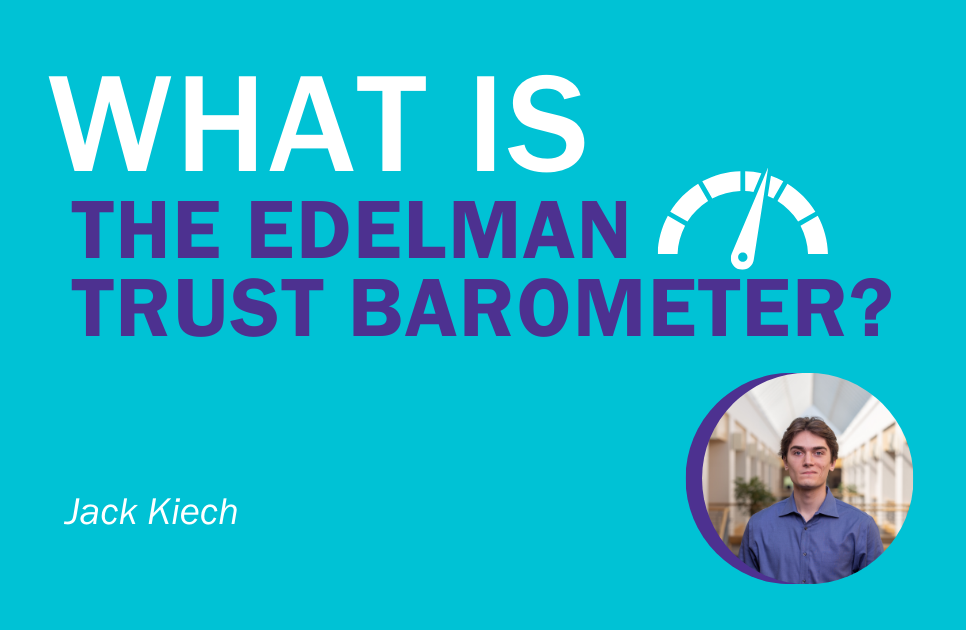What is the Edelman Trust Barometer?

Understanding the ever-changing web of opinions that forms our societal perceptions is essential to the art of public relations. Entry-level professionals and seasoned veterans alike engage in a continuous scramble to determine where their audience’s trust lies.
Edelman, one of the world’s leading public relations firms, has a long history of innovation in this category and developed a means of converting consumer trust into palatable data. Edelman’s Trust Barometer quickly became the industry standard for global attitude analysis after its inception over 20 years ago.
In 2000, Edelman first developed its Trust Barometer. Using a series of questions that are distributed to carefully selected samples across as many as 28 countries, the firm produces an annual report addressing the current state of societal attitudes. This research yields a report that goes public every January. As the year progresses, subsequent findings with specific areas of focus are published intermittently. Edelman’s website lists geopolitics and industry-specific trust trends as examples of such areas of interest.
While an analysis of trust on such a global scale is impressive on its own, Edelman’s secret to success is truly rooted in its ability to translate the globe’s opinions into data that is both insightful and practical. Knowing that China’s general public is experiencing an overall positive level of trust for its NGOs, businesses, government and media, for example, is an insight that has the potential to be a sizable part of a company’s business plan. However, a fact of this nature is infinitely more meaningful when it is easy to consume and properly contextualized. Edelman’s Trust Barometer is exceedingly capable of providing insights into both of these traits.
Though I could talk you through several examples like the one that I have just given, the best way to comprehend Edelman’s research is simply to see it for yourself. I will discuss screen grabs from 2024’s global report below. If you would like to view the report in its entirety, follow this link to Edelman’s website: https://www.edelman.com/trust/2024/trust-barometer.
This image comes from page 17 of 2024’s report and appears in a section called “Innovation is on the Ballot”. In this case, Edelman’s research indicates that, of their global respondents, most respondents view the government as incompetent in regulating new innovations. This finding is bolstered using a value system that compares the countries to each other. Being able to see that Saudi Arabians, for instance, have a unique trust in their government’s handling of innovations would be highly valuable to a public relations professional crafting a message for this audience. Similarly, the data for Saudi Arabia can be compared against not only other surveyed countries but also the global figure. This strikes me as particularly useful for multinational pursuits that need to be adapted in accordance with the needs of each target audience.
Let’s look at one more of Edelman’s slides from this section.
The example pictured above is also in the “Innovation is On the Ballot” section but presents a dataset with a focus on science. In this case, I can’t help but think about how applicable this data would have been around the time of the Covid vaccine releases. Tracking the rollout of each vaccine and its impact on public trust in government would make for some exceptionally useful data for those in the healthcare communications field. This is a great example of how directly applicable Edelman’s data can be for specialized industries and those with a particular need to track the fluctuations of public trust beyond the snapshot of current times.
Any industry professional or firm looking at this report would immediately appreciate how easy it is to comprehend quickly. Edelman’s choices in data presentation are every bit as important as the research that informs it. Though this year’s global report is nearly 90 pages, it functions like a practical handbook that can be referenced with great convenience. Every piece of data is clearly shown as a part of a larger insight and contextualized by strategic numerical values and graphics that give readers the ability to see each response as a fragment of the global opinion.
I’ve spent a great deal of time reading over the history of the Edelman Trust Barometer, as well as this year’s report. However, there can be no doubt that in my opinion Edelman is the definitive resource for information on this topic. Conveniently, the firm behind this research recently sent a panel of speakers to Depaul PRSSA’s 2024 District Conference, PRess Play, to discuss their trust barometer. Edelman’s speaker panel took the stage to wrap-up the conference’s first day. PRess Play attendees were able to dive deeper into Edelman’s use of the trust barometer in its own businesses, and learned about all the behind-the-scenes work that goes into its creation.
Press Play’s planning committee, attendees, and DePaul PRSSA would all like to thank Emily Marks, Lynn Hanessian, Najja Howard, Caroline Leary, Grace Ahlering Bush and Kaile Catalano for the wonderful provided during the Feb. 22 panel. DePaul PRSSA’s 2024 District Conference would not have been the same without Edelman’s help and generosity!
Jack Keich is a senior at DePaul University majoring in public relations. He is a member of DePaul’s PRSSA Chapter and was part of the planning committee for their 2024 District Conference, PRess Play.

